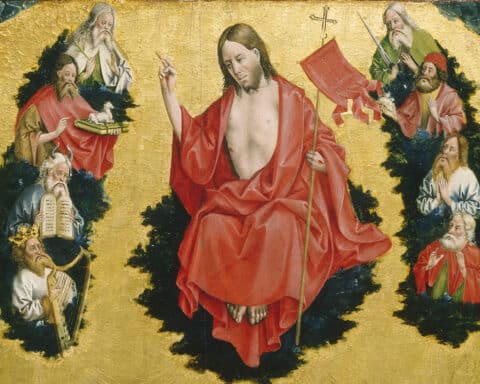In the readings for this Sunday, we encounter the beautiful passage from the first letter of St. John: “God is love” (1 Jn 4:8).
We also hear Christ speak to us from St. John’s Gospel: “This is my commandment: love one another as I love you. No one has greater love than this, to lay down one’s life for one’s friends. You are my friends if you do what I command you” (Jn 15:12-14).
These two passages sing out from the New Testament in stunning harmony, with John theologically affirming what Christ demonstrates. Christ’s great act of laying his life down “for his friends” reveals the very being of God: love itself.
Witnesses to love
In the history of the Catholic tradition, we find many more witnesses to this truth: Saints who rise in a great chorus as they respond to Christ’s words: “If you do what I command you … love one another as I love you.”
We could turn easily to the greatest saint of our times: Thérèse of Lisieux, the Little Flower. Therese once exclaimed: “My vocation is love! In the heart of the Church, my mother, I will be love, and then I will be all things.” In these words, St. Thérèse responded to Christ’s command, formulating it as a vocation, as a calling to be Christ’s love.
| May 5 – Sixth Sunday of Easter |
|---|
|
Acts 10:25-26, 34-35, 44-48 Ps 98:1, 2-3, 3-4 1 Jn 4:7-10 Jn 15:9-17 |
With this seemingly simple statement, Thérèse of Lisieux opened the hearts of so many ordinary folks to the life of holiness, which itself is nothing other than a life of loving God so well that we come not only to love one another as God does, but to love one another with God’s love. “For God is love,” as we know.
One of the very ordinary folks St. Thérèse influenced was her own sister, Léonie. Perhaps, the only really remarkable moment in Léonie’s life was when her sister was canonized. Everything else seemed totally mundane. As a child, she was capricious and stubborn, difficult to play with, and a poor student in school. Her whole life long, she struggled to find her vocation. Yet, she witnessed her little sister’s simple way of loving, and said, “Yes, even I can do that.” Today Léonie’s cause for sainthood is open. And just like St. Thérèse, Léonie still tells us from heaven, “I am ready and willing to help. Ask of me whatever you need.”
Yes. Even we can do this. And Christ has asked us to! It is a simple and beautiful task. It is a calling that can be lived out no matter who we are, our time in life, or our place in this world.
Indeed, another admirer of St. Thérèse reminds us just how important it is that we all — each and every one of us — heed Christ’s call to love. Toward the end of her little biography of St. Thérèse, Dorothy Day writes about Thérèse’s little way of loving.
To best describe this little way, Dorothy first recalls for us the tiniest of all things: the atom. And she reminds us of the great power of the atom: think of the cobalt bomb, she says. Love is a force stronger than this. Whenever an act of love is carried out, even a very small one, it releases the power of love upon the world.
To bring her point to a conclusion, Dorothy asks her readers, and I pass this question on to you: What if everyone recognized their vocation to be love? What if we all chose to “release” the power of love upon the world by responding to Christ’s commandment in love? “How easy,” Dorothy says, it would be to transform human society! She is right. Just listen to those saints sing … and join in their chorus!





